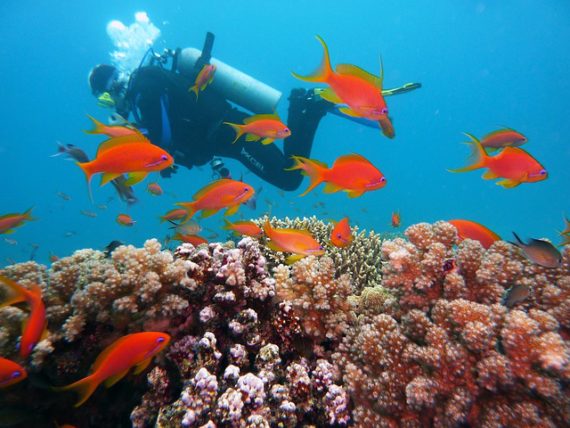
Diving Holidays in Egypt: Snorkeling, Scuba, or Free Diving
Yes, we know there are some of you out there still hoping and praying for spring to arrive, with its sunshine and warm weather. But here in Egypt, the beautiful, balmy weather is already upon us, and Spring Fever has hit hard. It’s that time of year when sweaters are going into the back of the closest, swimsuits are coming out, and everyone in the city begins dreaming of slipping away to the seaside for the weekend. There is no better time to come join the fun!
Egypt: Not Just Deserts and Pyramids!
Though many people only associate Egypt with the pyramids and desert, Egypt actually boasts over 2,400 kilometers (about 1,500 miles) of coastline — on not just one, but two seas! There’s the Mediterranean Sea to the north, and the Red Sea to the east. (Or, well, practically surrounding you if you’re on the Sinai Peninsula…)
So as you might imagine, there is no shortage of sea- and beach-themed vacations to be had here in Egypt. From May through October, Egypt’s beaches, sea-resorts, and water-front camps are in their high season. Whether it’s in Dahab, Sharm El Sheikh, Ras Sedr, Ain Sokna, Hurghada, Safaga, Marsa Alam, El Gouna, Alexandria, the North Coast … if you’re looking for the perfect holiday on the sea, why not Egypt?!
So Many Beaches, So Many Options
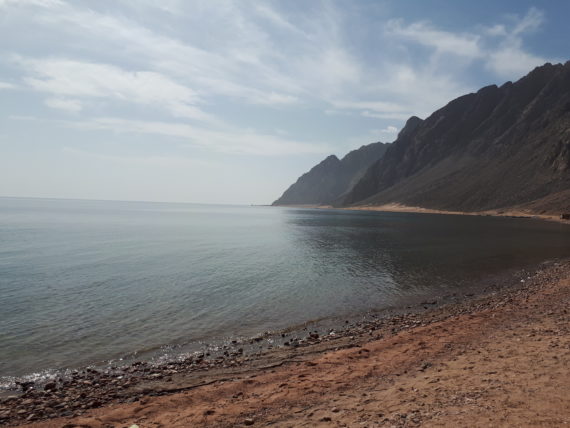 Sea Meets Sky at Wadi Gnai in Dahab via Christina Wichert
Sea Meets Sky at Wadi Gnai in Dahab via Christina Wichert
But what exactly are you looking to do? Are you the type of person who likes to lounge on the beach and soak up the rays, or do diving holidays in Egypt interest you? Is snorkeling at the surface your type of thing? Do you want to suit up and go deep with scuba gear, or do prefer to ditch the equipment and go au naturel as a freediver? Any and all of the above options are available to you on holiday in Egypt, and we are here to help you decide!
Even if you don’t know the difference between snorkeling, scuba diving, and free diving – that’s OK! While many people who come to Egypt have been doing these activities for years, others come to Egypt specifically to learn how. Some people THINK they’re coming just to “maybe try” snorkeling, but become so enthralled with the out-of-this-world beauty of Egypt’s seas – the coral gardens and marine life – that they decide on the spot to learn scuba diving (personal testimony: my parents!)
For those unsure of the difference between these three water sports, but are maybe too shy to ask … let me break it down for you!
Snorkeling
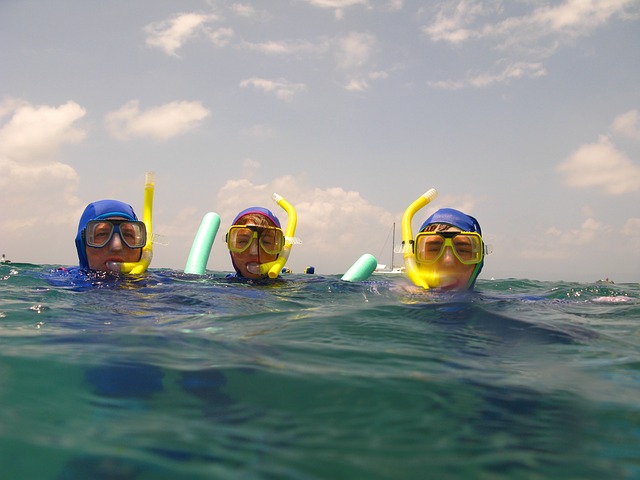 Snorkelers surfacing via Pixabay
Snorkelers surfacing via Pixabay
Snorkelers swim or float along the surface of the water but keep their face (eyes and mouth) in the water to view marine life from above. Snorkeling is generally done quite close to the shore (or close to a boat, if out at sea). It can be done in water as shallow as a couple meters as you swim above a reef, or in water as deep as 10-15 meters or more as you swim along the drop-off abutting a reef wall. If you are snorkeling ABOVE the corals, just be sure never to put your feet down on top of the living coral, and be sure your kicks aren’t so big that they hit the coral or disturb the marine life. You can hurt yourself or damage or kill the reef if you come too close to the reef.
This is your guide to the best full snorkel mask in 2018.
Equipment needed
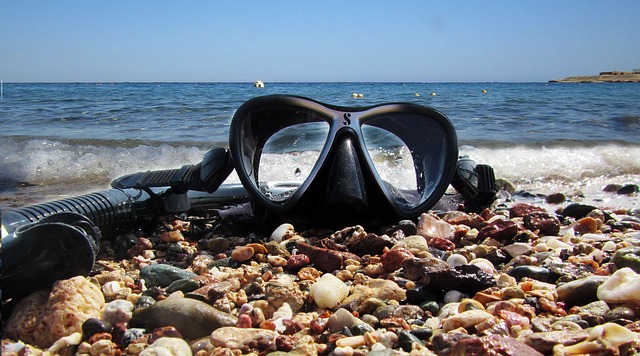 Mask and Snorkel via Pixabay
Mask and Snorkel via Pixabay
To snorkel you need a mask, snorkel, fins, and (optionally) a floatation device. Water shoes and rash guard/surf shirts are also nice for added comfort/protection. And always snorkel with a buddy!
Not Needed…
Any type of training or experience. Snorkeling is a great activity for people of all ages and ability levels! If you’re unsure of what to do, just paddle around in the shallows until you get the hang of it. Besides you’re likely to start seeing fish and other creatures even right up by the shore!
Further notes on the equipment for first-timers…
A good mask securely covers your eyes and nose to allow you to keep your face in the water with a clear view of what’s around you. Full-face masks that look sort of like giant face shields can also be used. A snorkel is basically just a curved tube used to breathe through; your head stays in the water while the other end of the snorkel sticks out of the water, into the air. The idea is to breathe normally without having to lift or move your head. The fins increase the surface area of your kick, making you move through the water more efficiently while minimizing your effort. A floatation device is something for you to either hold onto or wear, with enough buoyancy to support you and keep you above the surface of the water – especially if you’re not a strong swimmer.
FAQs about snorkeling
Do I need to know how to swim in order to snorkel?
No. Though knowing how to swim definitely helps, and allows you to be more comfortable in the water, it’s not necessary to know how. But BE SURE to WEAR a properly fitting life jacket (as opposed to just holding onto some kind of floatation device) and for safety, ALWAYS snorkel with a buddy (this goes for everyone – not just non-swimmers). Also keep more space between you and the reef if you’re not that great at maneuvering in the water.
Can I wear contact lenses while I snorkel?
Yes, and if you need them, you definitely should – otherwise what are you going to see? Just make sure your mask fits nice and tight, and maybe have a backup pair of lenses back at shore, just in case … though I personally never lost a single pair of contact lenses to the sea in all my years or snorkeling (or diving). It is also possible to purchase your own, specially-ordered snorkel or diving mask with a prescriptive lens (like underwater glasses!) but that can be quite a costly investment!
Where can I get the equipment I need?
It’s rented out in abundance near any good snorkeling site, so you don’t need to worry about packing or bringing your own…although the quality of the equipment does vary from place to place. Worst case scenario, you can do without just about any of the gear, other than the mask, and still have a good snorkeling experience!
Scuba Diving
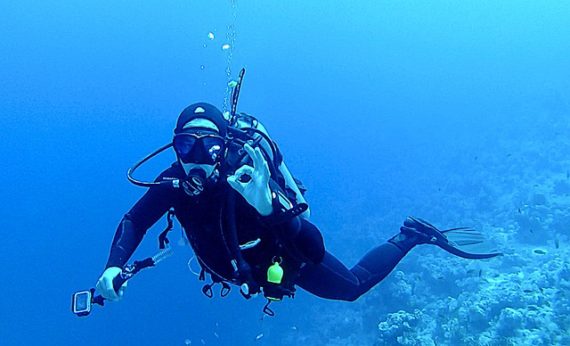 Scuba Diver via Pixabay
Scuba Diver via Pixabay
The word “Scuba” is an acronym; the letters stand for Self Contained Underwater Breathing Apparatus. So in a nutshell, that’s what scuba diving is: using equipment that allows you to carry an air supply and breathe underwater, thus extending the depth and amount of time you can spend below the surface. Better yet, scuba diving allows you to get up close and personal with the aquatic environment and marine life.
Recreational diving: Diving to depths of no more than 30 meters (100 feet) — or up to 40 meters maximum with deep diving specialty certification, and staying within in no-decompression-stop limits.
Technical diving: Executing dives that exceed the depth and bottom-time limits of recreational diving. Technical divers have advanced training and special equipment that allow them to safely exceed these limits.
Be it recreational or technical, scuba diving is like stepping through a door to a different dimension. Scuba diving gives you a completely different perspective from even a snorkeler. As a snorkeler, stuck on the surface, it’s like you’re an intruder, just peering over the edge or peeking around corners. As a scuba diver, you’re there in the middle of everything, a part of it all, ‘one’ with the sea around you. Think I’m crazy? Try it yourself – you’ll see!!
Equipment needed
Quite a bit. And you’ll learn all about it when you take your certification course (first and foremost, you must get certified to dive). But don’t be intimated by the amount of equipment you use; by the end of a good diving certification course, it will all seem like second nature to you. Scuba diving equipment includes a diving cylinder (the tank containing your air supply), regulator (the device delivering the air supply to you), a Buoyancy Control Device (commonly known as a BCD), mask (same as the one used for snorkeling), fins (can be similar to a snorkeler’s but generally a bit larger and more heavy-duty), an exposure suit (i.e. a wetsuit) if conditions call for one, and weights to counteract your buoyancy.
This comprehensive buying guide will tell you all you need to know about the best dive computers & watches.
FAQs about scuba diving
Do I need to know how to swim to scuba dive?
Perhaps surprisingly, not really. Like snorkeling, knowing how to swim can certainly make diving easier, and often allows you to have a greater level of comfort in the water. But you definitely don’t have to be an amazing swimmer. While diving certification courses generally have a 200 meter swim test as part of a prerequisite for the beginner’s course, any sort of “stroke” (even a doggy-paddle!) is acceptable – just so long as you keep your feet off the bottom for those 200 meters!
Actually, one common mistake many beginning scuba divers make is they think that diving is just like swimming underwater – and it’s not! Swimming at the surface requires almost constant motion. With scuba diving, on the other hand, less movement is sometimes more. Ideally, you want to “hover” along, with minimal motion, almost as if suspended between the surface and the seafloor. A good swimmer does not always make a good diver; a good diver is not always a good swimmer.
Can I wear contact lenses while scuba diving?
Yes. Same as snorkeling. If and when you have to clear your mask from a water leak, you just close your eyes while doing so. Have a backup pair of contacts with you on the land, but under normal circumstances, you shouldn’t have any problems.
Isn’t scuba diving dangerous?
It can be – for people who don’t learn to do it safely, and don’t follow good practices of diving within their limits. But the same goes for any type of sporting activity. By following the proper safety procedures and understanding your own personal limits, much of the risk is mitigated. That’s why learning to dive from professional dive instructors who make sure you really understand all the ‘hows’ and ‘whys’ makes all the difference in the world.
If you have any medical conditions that you’re worried about affecting your dives – do check with your doctor before diving. You’ll be asked to fill out a medical questionnaire before you dive anyway, so it’s better to have all your bases covered before you get there.
Free Diving
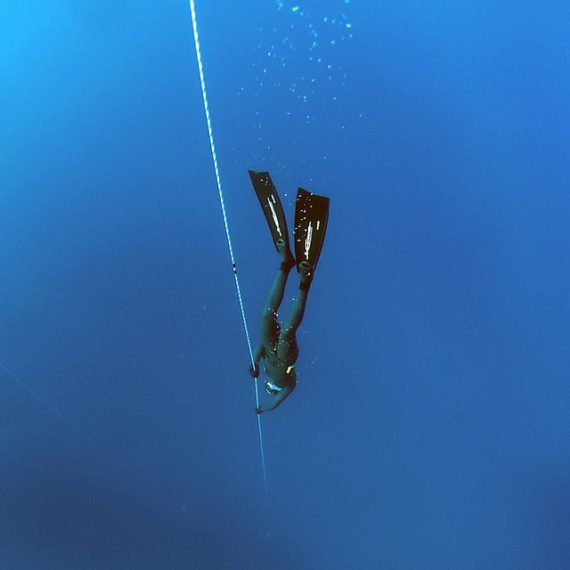 Free diver following a guide rope via Pixabay
Free diver following a guide rope via Pixabay
A free diver uses minimal equipment, and dives under the surface of the water as deep as they can go holding a single breath of air. There’s free diving in the casual sense; if a snorkeler or someone swimming along wants to get a closer look at something a bit farther under the water, they can take a breath and swim down a few meters, staying under the water for generally less than a minute. Technically that is free diving. Then there are serious and even competitive free divers, who train mentally and physically to be able to extend the amount of time they can hold their breath, and who can kick down to depths of 10 meters, 20, 30, or even more or a single breath of air!
Actually, top free divers from all over the world come to Dahab in Egypt to attempt to reach The Arch, a geologic formation 56 meters (186 feet) from the surface of Dahab’s famous Blue Hole. This feat pushes one’s skill and endurance to their absolute limits. Sadly, not everyone who has made this attempt has lived to tell the tale.
Equipment needed
Some free divers use fins (many times free divers use a ‘monofin’ that looks like a mermaid or dolphin’s tail) and weights, while others dive with no equipment whatsoever. When attempting great depths, free divers descend and ascend along a guide rope for safety. Most importantly of all, free diving requires a BUDDY. Never, ever, EVER free dive alone – even while training in shallow water or a pool.
Because free diving uses so little equipment, many people mistakenly think there’s nothing too it, and can just give it a try on their own. But even experienced free divers sometimes momentarily blackout from holding a breath for too long; if that blackout happens before reaching the surface, that diver is in danger of drowning – even in as little as 2 or 3 meters of water, or less! And no amount of training can help an unconscious diver – only having a buddy or spotter can make the difference. That’s why a buddy at the surface always acts as a spotter, to ensure the diver makes it back to the surface each time.
Video of the first no fins, no suit freedive through the Arch, a 30m long tunnel connecting Dahab’s Blue Hole to the Red Sea at a depth of 55m, completed by William Trubridge the world record holder in unassisted freediving
FAQs about Free Diving
Do I need to know how to swim to be a freediver?
Yes. Strong swimming skills are a must.
Is free diving dangerous?
It definitely can be. But being properly trained and taking the right safety precautions definitely helps. However, with free diving, the risk of a shallow-water black-out is always a possibility. Free divers attempting extreme depths have a team of safety divers (and sometimes even safety scuba divers) monitoring their dives, but sometimes even the safety divers can be at risk of blacking out. Again, never, ever free dive alone.
Now You’re Ready
With all this information, you should be ready to plan your Egypt diving holidays! Whether you decide to snorkel, scuba dive, free dive … or even stay dry on the shore and live vicariously through the pictures and stories the divers bring back to the surface, why not spend your next sea-side holiday in Egypt?!
This post contains some affiliate links, by booking through these links, we will get a small commission that will help us maintain this site and make it grow, at no extra cost to you.
We hope you really liked this blog post, if you want to ask us any questions, or engage with other people, join our Facebook group here.
Leave a Reply
You must be logged in to post a comment.


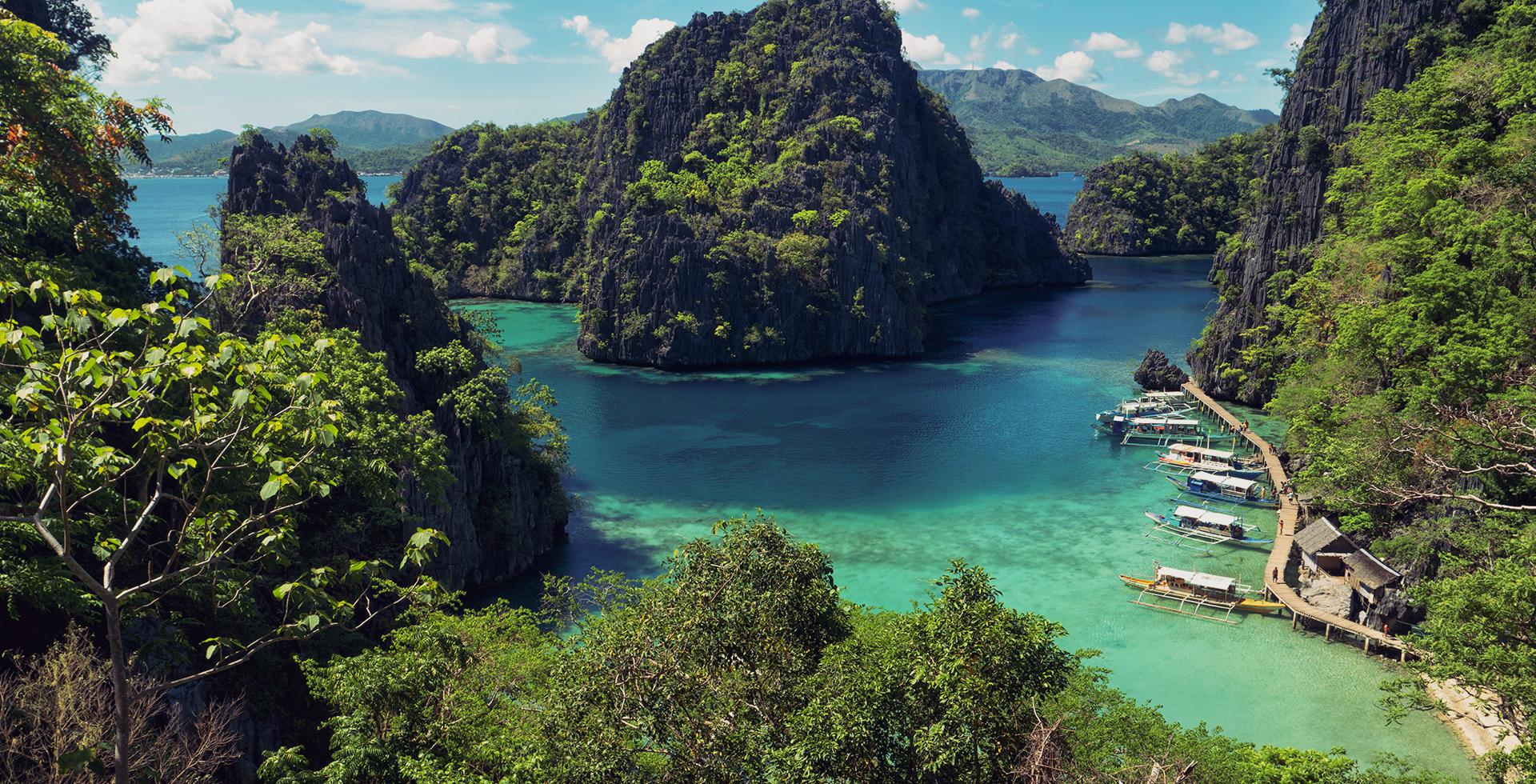

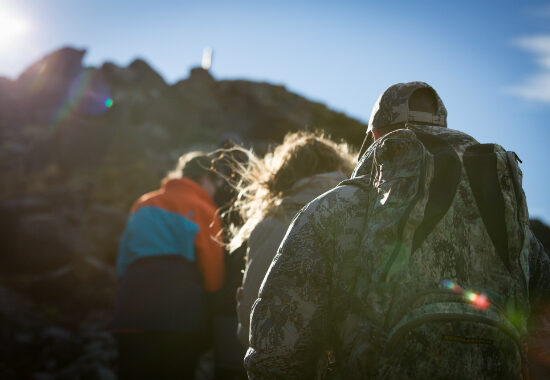
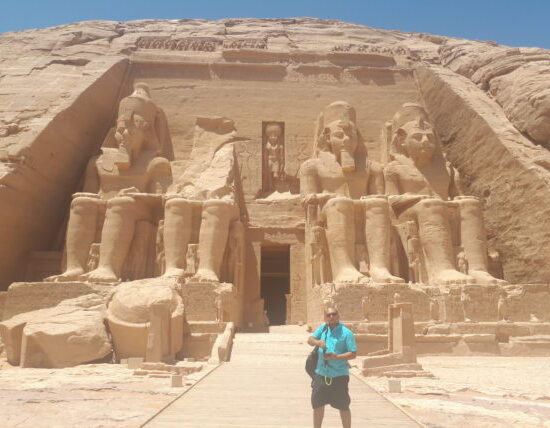

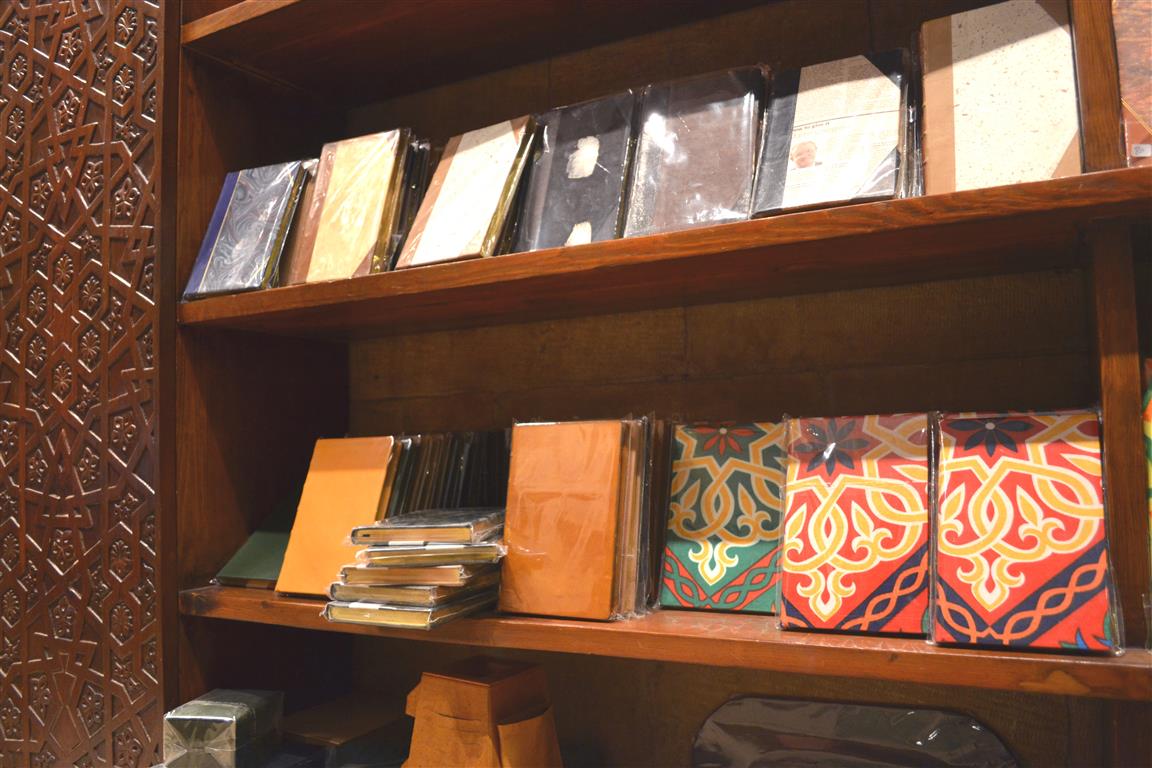
Pingback: Beginners Guide to Red Sea Diving in Egypt | Why Not Egypt?
Pingback: Alexandria: Not Just Egypt's Food Capital | WhyNotEgypt?
Pingback: Complete Guide to Hippie Dahab | Why Not Egypt?
Pingback: Women of Egypt - Smashing Stereotypes (Part 1 of 2) - WhyNotEgypt?